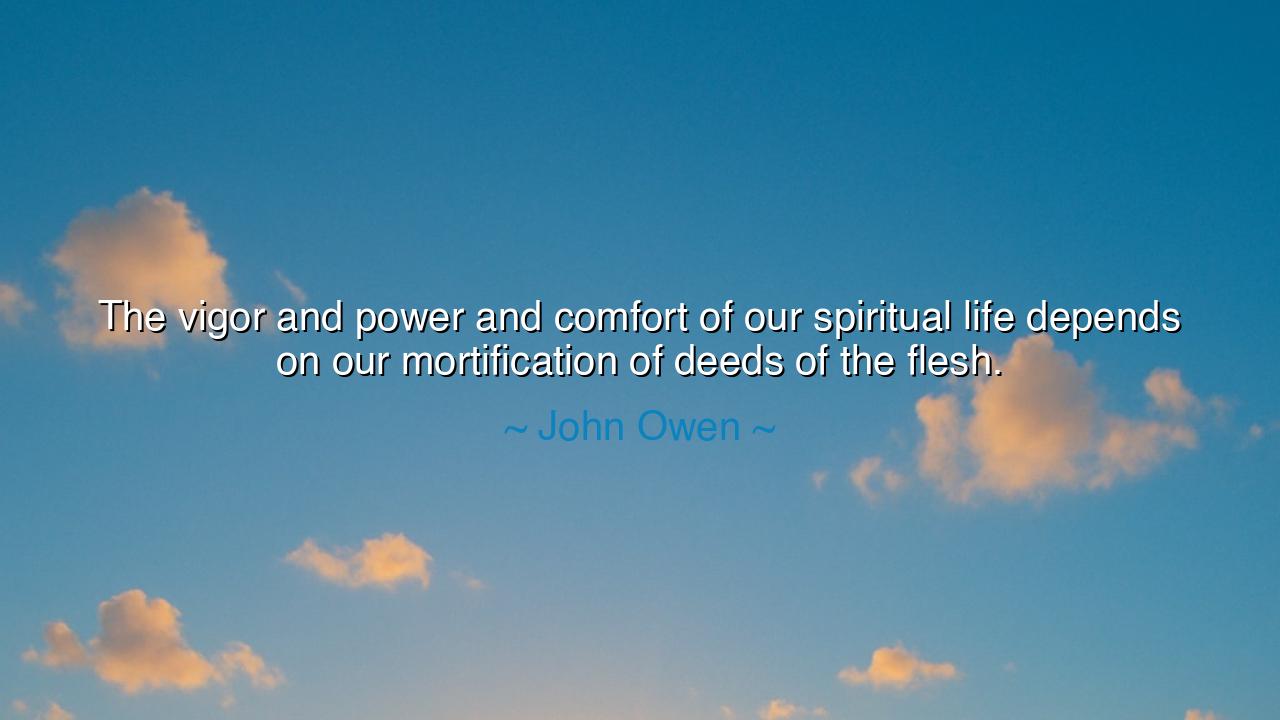
The vigor and power and comfort of our spiritual life depends on
The vigor and power and comfort of our spiritual life depends on our mortification of deeds of the flesh.






In the words of John Owen—“The vigor and power and comfort of our spiritual life depends on our mortification of deeds of the flesh.”—we hear the cry of one who knew that the soul cannot soar while chained to the body’s unruly desires. To mortify the flesh is not to despise life itself, but to bring into subjection those cravings and impulses that enslave. For the spiritual life thrives not in indulgence, but in discipline, and only when the lower is mastered may the higher be free.
The ancients taught this with fervor. Plato, in his allegory of the chariot, described the soul as drawn by two horses: one noble, disciplined, striving upward; the other wild, unruly, plunging downward. Only by the firm hand of reason could the charioteer direct both and ascend toward truth. Owen speaks in the same spirit: the deeds of the flesh, unchecked, drag the soul downward; subdued, they become the very strength by which the spirit rises.
This mortification is not mere denial, but transformation. The monk in his cell who fasts, the warrior who restrains wrath, the leader who resists corruption—each proves that mastery of self yields not weakness, but vigor. For to indulge is to be ruled, but to subdue is to rule. The comfort Owen speaks of is not the fleeting comfort of indulgence, but the deep, abiding peace of a soul no longer torn apart by its own appetites.
History gives us a mirror in the life of Marcus Aurelius, emperor of Rome. Surrounded by wealth, temptation, and power, he wrote in his Meditations of the need to live with simplicity, to govern his passions, and to see death as no terror. Though he commanded armies, his greatest battles were within, against vanity, anger, and lust. In his discipline we see the truth of Owen’s words: only through inward conquest does outward greatness endure.
Thus, let this teaching be passed down: the power of the spirit is found in the taming of the flesh. To mortify is not to destroy, but to cleanse; not to hate the body, but to refuse its tyranny. In such mastery lies strength, in such discipline lies freedom, and in such victory lies the comfort of knowing the soul is no longer servant to desire, but sovereign in the service of God.






THTuong Ho
This quote points to an ongoing internal conflict between our physical nature and spiritual goals. Mortifying deeds of the flesh could be a powerful tool for spiritual growth, but it raises the question of how much we should suppress our human desires. Is there a risk of self-denial leading to imbalance or repression? How do we navigate this tension in a way that leads to true spiritual freedom rather than feeling restricted?
QAPham Quynh Anh
I understand what John Owen is getting at, but I’m not sure if I fully agree with the idea that spiritual strength depends entirely on controlling our earthly desires. It seems like there must be a more integrated approach, where both the body and spirit are nurtured together. How do we reconcile the idea of self-discipline with the idea of enjoying life’s pleasures without guilt? Is it possible to thrive spiritually while embracing both aspects of our humanity?
TY42. Thu Yen
John Owen’s perspective raises an interesting point about the relationship between physical actions and spiritual health. The idea of mortifying deeds of the flesh might seem extreme to some, but perhaps there is wisdom in focusing on self-control for spiritual clarity. Do you think this concept of mortification still applies to modern spirituality, or has our understanding of spiritual growth evolved in a way that incorporates the body more holistically?
THThao Halona
This quote by John Owen really highlights the struggle between our physical desires and spiritual well-being. The idea that our spiritual vitality depends on controlling our earthly impulses seems challenging in today’s world, where indulgence is often seen as normal. It makes me wonder, is there a balance between honoring our physical needs and striving for spiritual growth? How do you find this balance in everyday life?